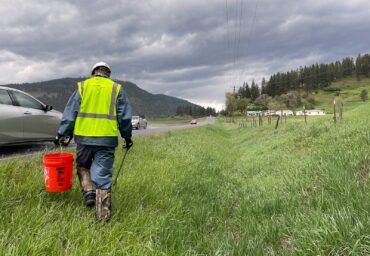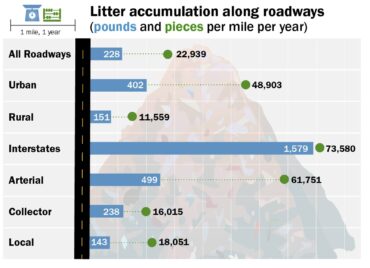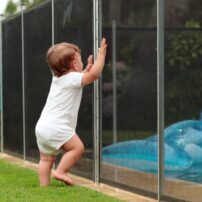Even though 75% of Washington residents never litter, a new statewide study commissioned by the Washington Department of Ecology finds that more than 26 million pounds (13,096 tons) of waste accumulates along Washington roads every year.
And despite our state spending approximately $12 million annually on cleanup efforts, only a small fraction ever gets picked up. Millions of pounds of litter are left behind, negatively impacting Washington’s environment, wildlife, waterways, public health, safety and economy.
The study, which included two sampling sites in Kitsap County, counted an average of 8,112 pieces of litter per mile on Washington roadways last spring. This is 42% more pieces of litter per mile than the national average. It’s not clear why Washington appears to have significantly more litter on its roads — this is the state’s first study of its kind since 2004. There is no single category of litter or location that stands out as a driver of the disparity.
 Who’s responsible for all this litter? We all are — although some of us more than others. Research shows that 75% of Washingtonians choose to do the right thing and not litter — but the biggest offenders among the other 25% are men 18-44 years old. Why do they do it? The most common excuse is simply not having a litter bag in their vehicle or the equipment needed to properly cover and secure their load.
Who’s responsible for all this litter? We all are — although some of us more than others. Research shows that 75% of Washingtonians choose to do the right thing and not litter — but the biggest offenders among the other 25% are men 18-44 years old. Why do they do it? The most common excuse is simply not having a litter bag in their vehicle or the equipment needed to properly cover and secure their load.
Although litter cleanup efforts in 2023 increased statewide and in Kitsap County, there is more litter deposited than can be cleaned up.
Everyone has a part to play in keeping Washington beautiful and litter free. Preventing litter from ending up on the ground is more effective — and cheaper — than paying crews or arranging for volunteers to pick it up.
Preventing litter in Kitsap
Keep a litter bag in your car.
Ecology’s research identified “not having a trash bag in the car” as one of the top reasons people litter. In the past, Ecology has given away a large amount of litter bags in Kitsap County and other urban areas to address the need. This time, the “We Keep WA Litter Free” campaign is partnering with Washington Food Industry Association and food distributor URM to give away free, reusable car litter bags at grocery stores in areas outside of Kitsap County. Visit the campaign website to see where these are available.
You don’t need a special litter bag to make a difference in the fight against litter; any bag that’s handy works! Place a bag in your car today to help fight litter.

Caught without a bag? Simply hold on to trash from your travels until you reach your destination or a waste receptacle at a stop along the way. It may not seem like a big deal to toss the occasional bag or bottle on the ground, but those decisions add up to millions of pounds of litter (and millions of dollars of clean up) every year in Washington.
Live litter free and help others do the same.
Make sure your friends and family know how to live litter free and help them make better choices. When we all look out for each other, it makes a big difference for our county and state.
According to 2021 research commissioned by Ecology, about 26% of litterers say they would be motivated to stop if “a friend, family member or passenger asked me to refrain.”
Secure your load to ensure safer roads and to avoid fees.
In August, Kitsap County waste facilities began strictly charging a $10 fee for unsecured vehicle loads arriving at the facilities. Prior to this date, drivers with unsecured loads typically received warnings and education. Nearly 380 customers across four facilities were charged the fee in August and received education about load security.
The fee was one part of the local “Secure Your Load for Safer Roads” campaign that kicked off in May 2023. The campaign also included law enforcement emphasis patrols and giveaways of cargo tie-downs.
As a result of the campaign, waste facility staff report that many more customers are securing their loads to avoid the fee. For tips on how to secure your load, watch the new Washington State Patrol video (also available in Spanish).
























Comments